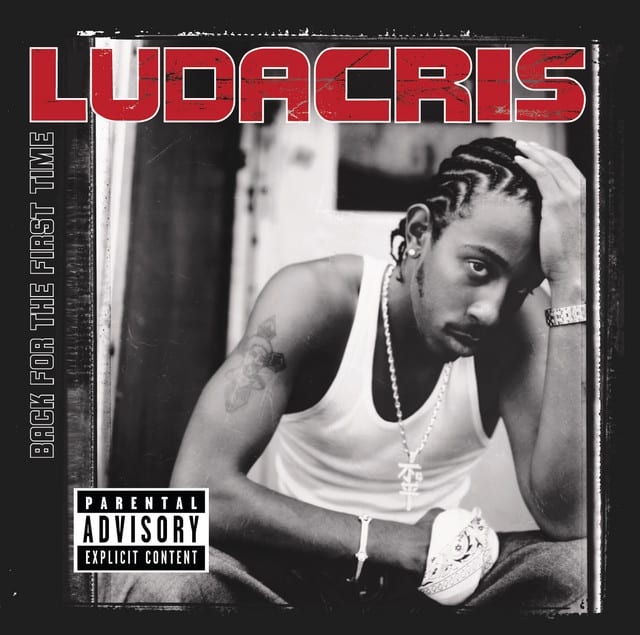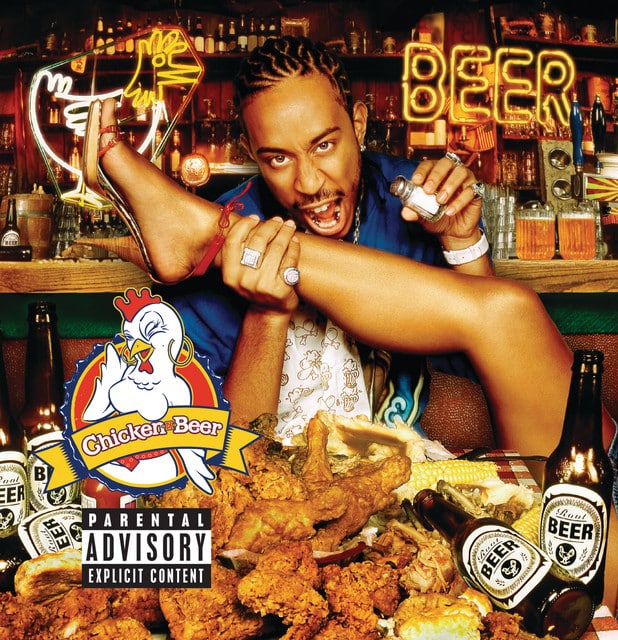The year was 2001, and hip-hop was witnessing the ascension of a new titan, Christopher Bridges, better recognized as ‘Ludacris’. Still riding on the wave of his prior blockbuster project, ‘Back For The First Time’, Luda dropped the sonic bombshell, ‘Word of Mouf’, further solidifying his position in the annals of hip-hop. This was an album that flexed Ludacris’ versatility, serving us a smorgasbord of stylings from the southern-fried funk of “Coming 2 America” to the braggadocious essence of “Rollout (My Business).”
Not just a showcase of varying aural textures, ‘Word of Mouf’ also presented an array of thought-provoking and tête-à-tête-worthy lyrics. Ludacris peppered each track with potent bars that reflected on societal dynamics, as seen in “Area Codes,” while some harped on narrative stories, like “Growing Pains.” The lyrics were smoky and mirror-like, reflecting the realities of life in the American South, a powerful nod to Ludacris’ Georgia roots. His weaved tales of the streets, triumphs, tribulations, and the importance of staying true to one’s self, all while keeping listeners entertained with his signature wit and delivery. Yet, much of the brilliance embedded in these lyrics often goes unnoticed.
So, we’re about to embark on a journey down memory lane, unlocking the hidden gems in ‘Word Of Mouf’. So let’s get into it. From “Coming 2 America” to “Block Lockdown”, here are the Breaking down the Lyrics on ‘Word Of Mouf’ by ‘Ludacris’.
1 Coming 2 America
Ludacris announces his arrival with a confidence that’s contagious, harkening to Eddie Murphy’s fictional African monarch from the 1988 film the track’s title instructs. The ATL icon uses this platform to lay claim to his throne in the dirty South, while engaging in playful braggadocio about his status and riches.
But the bravado never eclipses his biting humor or clever wordplay. Ludacris crafts punchlines like a seasoned comedian – from likening his rap career longevity to a dad’s receding hairline, to flexing by claiming he packs more “nuts” than an airlines. He also throws in clever pop culture references, such as a Saved by the Bell name-drop, and a jab at Monopoly’s jail rules. The track is classic Luda – fun, irreverent, and proof he’s the king of Southern hip-hop.
2 Rollout (My Business)
Ludacris masterfully layers braggadocio with social commentary, highlighting that despite his success, his roots in the hood aren’t forgotten. This joint is all about marking his territory, flashing his success with twin Glock 40s, a Benz with tinted windows, and platinum chains, while fiercely maintaining his privacy.
The song is a push back against the invasive questions he faces — people wonder about his wealth, his car, and even his weed supplier. Each question is met with resistance, as Ludacris asserts his right to privacy. But there’s a deeper narrative here too — a prevailing tension between maintaining authenticity in the face of commercial success and the pressure to represent the realities of the hood while navigating the trappings of fame. The chorus is a catchy warning shot to the world: stay out of his business. Overall, “Rollout (My Business)” stands out as a testament to Ludacris’ lyricism and his ability to navigate complex socio-cultural landscapes within the context of hip-hop culture.
3 Go 2 Sleep
Luda, famed for his theatric lyrics, adopts a sinister tone here, unloading bars with a remorseless candor. The recurring directive “Go to sleep, hoe” underscores his stern message to detractors and foes, showing an assertive, no-nonsense side of the charismatic emcee.
Ludacris’s lyrics delve into the harsh realities of street life, painting a grim picture of survival, power, and dominance. He uses vivid imagery to depict a landscape filled with hostility and turmoil. The track also speaks to his versatility as he switches from his usual playful, animated style to a more menacing narrative. He talks unfiltered about drugs, violence, and braggadocio, themes prevalent in Southern hip-hop, turning the track into a forceful statement of his credibility in the game.
Overall, “Go 2 Sleep” is not just a song – it’s Ludacris drawing a line in the sand, challenging the status quo, and refusing to be slept on. It embodies the struggle, ambition, and defiance deeply embedded in hip-hop culture and Ludacris’s personal artistic persona.
4 Cry Babies (Oh No)
The track is laden with metaphoric language that finds him lyrically flexing in the face of challengers. Fear and intimidation are the orders of the day here, as Luda’s cocky verses come from a place of untamed confidence, punctuated by his repeated declaration, “Cry babies go home.”
His flow bounces and booms, painting vivid scenarios about his street prowess, his sexual exploits, and his baller lifestyle. The hook invokes images of violence, a firm assertion of his power in the game. This isn’t just about punching and shooting; it’s a metaphorical assault against his competitors, suggesting their inferiority. The iconic ATLiens rapper uses a variety of cultural, gaming, and sports references to amplify his points, from Scrabble and duck hunt to boxers and Chris Webber. It’s clear that Luda is in his element, fearlessly staking his claim in the rap game while confidently dismissing any would-be detractors.
5 She Said
Sharp wordplay meets raw storytelling, as Ludacris pushes the narrative envelope by unveiling the pretenses and lies behind a seemingly virtuous character. This female protagonist is depicted as a churchgoing virgin resisting the temptations of the world, upholding a standard of purity – or so she claims.
The irony, however, is that her reality is a stark contrast to her well-crafted facade. From being deceitfully rebellious to exploring her erotic desires secretly, she routinely contradicts her public image. Ludacris artistically lays bare these contradictions, calling out her hypocrisy. The character becomes symbolic of societal duplicity and how appearances can be misleading.
Ultimately, Ludacris shines a light on the societal pressure for maintaining appearances, the mandate of perceived purity, and the tendency to hide one’s true desires behind a mask. “She Said” is an audacious exploration of truth and authenticity, a testament to Ludacris’ lyrical prowess and his knack for sociopolitical commentary.
6 Howhere – Skit
This track catches Luda in a casual, off-guard moment, shooting the breeze with a homie. The exchange rolls out like a conversation between two hustlers trying to stay on top of their game in a chaotic world. The skit delivers a humorous take on life with the play on ‘hoe’ within geographical locations, manifesting Ludacris’ penchant for linguistic acrobatics and quick wit. Far from just filling the space between tracks, this skit captures the authentic vernacular of Atlanta’s streets and acts as a stark reminder that the struggle don’t stop. But in quintessential Luda fashion, he presents it with a laid-back humor that keeps the vibe light and approachable. This track encapsulates the grit, humor, and unabashed reality that Ludacris brings to the hip-hop game.
7 Area Codes
The lyrics are packed with a multitude of area codes from across the US, emblematic of Ludacris’ widespread popularity. The repetition of “I’ve got hoes in different area codes” is an audacious testament to his player lifestyle and worldwide recognition. In the song, different cities are referenced as he rattles off various location’s dialing codes, painting a picture of his nationwide allure. Ludacris is not shy about his ability to attract attention wherever he goes, cementing his reputation as a sought-after figure. In typical Luda fashion, the lyrics are laced with humor and a playful arrogance. The song is a bold effusion of braggadocio, a common theme in hip-hop, illustrating Ludacris’ confident persona and his domination in the rap game.
8 Growing Pains
You can virtually smell the fresh spray paint and feel the thick herringbone chains around their necks. This ain’t no fairytale, though. The track serves as a poignant reminder of the dark side of coming-of-age in an environment marked by crime, violence, and societal challenges.
Luda doesn’t romanticize. He lays out the details with an unflinching eye, recollecting met challenges with neighborhood bullies, causing his listeners to flinch as he recalls a tragic prom night tale. Yet, throughout the narrative, he emphasizes the bonds formed through shared struggling, camaraderie, and collective survival. His storytelling prowess shines as he plunges into the specifics of his youth, intertwining cultural references, humor, and moments of gut-wrenching honesty. Ultimately, “Growing Pains” is a nod to the strength of communal fortitude in the face of adversity and a testament to how these experiences molded Ludacris into the artist and man he is today.
9 Greatest Hits – Skit
The track is a satirical interlude that features ‘random white people’ attempting to emulate Ludacris’ style and rhythm. Marked by irregular beats and off-key deliveries, the skit serves as a brilliant meta-commentary on the cultural appropriation within the music industry.
This mischievous skit finds its humor in the discord between the performers and the material they’re attempting to deliver. Inserting his own hit lyrics into an unfamiliar context, Ludacris cleverly confronts listeners with a distorted reflection of his own music, in a way that highlights the cultural and stylistic nuances that make hip-hop a distinct and powerful art form.
Luda’s biting sarcasm on this track is a representation of his ability to weave socio-political commentary into his work, showing us that he’s not just a rapper but a critical observer of the culture he’s part of. It emphasizes the importance of authenticity in hip-hop, a genre deeply rooted in specific lived experiences and cultural expressions.
10 Move Bitch
This track from ‘Word Of Mouf’ gets you hype and embodies the unapologetic energy that was quintessentially ‘Luda’. The lyrics hit you with a fast-paced narrative, as Ludacris takes us on a ride through his chaotic life, fueled by fame, success, and a certain recklessness, nodding to his D.T.P. (Disturbing Tha Peace) crew and his roots in Decatur, Georgia.”
The verses paint a picture of Ludacris taking on life full throttle, addressing the struggles of living in the public eye, from groupies to child support. He embraces the unpredictability, recklessness, and pure adrenaline of his life on tour, and doesn’t hesitate to call out those who may attempt to slow him down. The chorus is a powerful and assertive command, symbolizing his refusal to be hindered, whether on the road or in life. Throughout the track, Luda asserts his belief in standing one’s ground, and not succumbing to critique or crowd pressures. “Move Bitch” perfectly encapsulates Ludacris’ fast-paced life at the zenith of fame and remains a quintessential hip-hop anthem.
11 Stop Lying – Skit
Without a beat, the skit unfolds over a phone conversation, where Luda paints a humorous yet relatable picture of a fumbling player trying to impress ‘the Buckhead girls’ with borrowed bling and rented cars.
Here, one feels Ludacris’ exceptional storytelling play out in a real-world scenario. He discusses the notion of honesty in interpersonal relationships and the role of materialistic allure in attraction. The skit brings a dose of reality, showing the pitfalls of trying to be someone one’s not, but does so in a comical, self-deprecating manner. We see a less glamorous but more relatable side to Ludacris’ persona in this skit, which adds depth to the overall narrative of ‘Word Of Mouf.’
12 Saturday (Oooh! Ooooh!)
The playful and vibrant beats give the track an infectious buoyancy, encouraging us to revel in the fullness of a Saturday. The lyrics sketch an image of a day brimming with wealth and excess, highlighting Luda’s signature blend of humor and self-assured swagger.
He the spits bars about cruising in his black truck, flaunting his bling, and causing a ruckus wherever he goes. At times, his verse dips into the darker shades of life, referencing his origin in College Park and the illicit activities he’s seen. The chorus has a hypnotic repetition of ‘sticky, icky, icky’ – a coded nod to cannabis usage – pointing to Ludacris’ unabashed embrace of hedonistic pleasures.
Ultimately, “Saturday (Oooh! Ooooh!)” captures the essence of a weekend spent in hustle, fun, and an unabated celebration of life in the Dirty South. It’s Luda at his best, proof that he’s rightfully claimed his spot in hip-hop royalty.
13 Keep It On The Hush
Luda drops storytelling prowess, maintaining that streetwise edge while navigating personal relationships. The track serves as an unspoken agreement, an intimate encounter cherished in secrecy. Ludacris uses vivid metaphors to describe the steamy private affair, the necessity to keep quiet and the pleasure derived from the quietude. His lyrical prowess is top tier with lines that are cleverly cheeky, yet provocative, tapping into a lustful narrative that’s more sensory than explicit. He manipulates words to underline the dynamics of these surreptitious affairs, emphasizing the importance of discretion and respect. This is Luda at his best – funny, confident, and entirely in his element, offering an audacious portrayal of intimate encounters set against a backdrop of secrecy and hushed whispers. This might not be for the faint-hearted, but it’s pure Ludacris – unashamedly bold, unapologetically risqué.
14 Word Of Mouf (Freestyle)
Luda’s quick-witted, relentless flow gives us a window into his star-studded lifestyle, filled with women, wealth, and the glorification of his personal success. The ‘Dirty South’ charm is strong here, with mentions of malt liquor and gritty street scenarios, working them into his rhymes like he’s sketching a vivid, in-your-face mural of his world.
The lyrics deal out braggadocio with a generous hand. But underneath the glitz, there’s a pulse of defiance, a proclamation that he’s risen above his critics, doubters, and haters. Particularly striking is the line where he attributes his success to money speaking for itself, demonstrating his rise from humble beginnings to hip-hop heavyweight. In typical Luda style, there’s a good dose of humor and audacity too, keeping the track fresh and crackling with energy.
Ludacris’ freestyle game is strong here, interweaving references to pop culture – Lawrence Taylor and Rod Piper – into his flexible rhymes, showing off his lyrical muscle while keeping the track grounded in the culture. The cherry on top? His mentions of his beloved Atlanta, an important piece in the larger cultural tapestry that informs his music. “Word Of Mouf (Freestyle)” is Ludacris in his purest form – audacious, unapologetic, and infectiously confident.
15 Get The Fuck Back
The track explores Luda’s confrontational stance towards those who dare challenge him, whether in hip-hop or in life. His verses are filled with jarring visuals and forceful threats that powerfully express his assertive outlook. As Luda navigates through the song’s grimy beats, he drops bars about his corporate haters, rivals on the street and even those who slight him in the club. The confrontational and fiery nature of this track is a testament to Ludacris’ ability to paint vivid stories with his words. Throughout, the Dirty South rapper’s indomitable spirit and relentless confidence shine, firmly establishing this track as not just a statement of intent, but also a warning: Cross Ludacris at your own peril.
16 Freaky Thangs
As the title suggests, the song is a dive into the rapper’s escapades, where boundaries are non-existent and inhibition is an alien concept. Luda’, along with Twista and Jagged Edge, doubles down on touting his prowess and stamina, weaving a storytelling tapestry that’s as explicit as it is entertaining.
The way the lyrics fluidly walk you through the individual scenarios with risqué humor and vivid imagery is pure Ludacris. In true ‘dirty might-done’ Luda’ style, he combines humor, sexual braggadocio, and quintessential southside charm. The beat complements the raunchiness of the lyrics, creating a playful atmosphere that fits the overall context of ‘Word Of Mouf’. In the grand scheme of the album, “Freaky Thangs” serves as a bold insistence of Luda’s sexual charisma and his reckless abandon in the pursuit of pleasure. While it’s certainly not for the conservative listener, the track blends well in the audacious sonic narrative of ‘Word Of Mouf’.
17 Cold Outside
This track serves as a narrative window into his life experiences, extending beyond the glitz and glamour often associated with the rap game. The harsh realities of the streets are laid bare, juxtaposed with the struggle for success and acceptance in the industry. It’s a cautionary tale and an open letter to those who think fame nullifies struggle. Here, Luda flexes his lyrical prowess, deftly weaving intricate, hard-hitting bars that resonate with lessons, warnings, and raw realities. His vivid storytelling, fueled by intense emotionality, stamps “Cold Outside” as a testament to his artistic depth. Yet, it’s a somber reminder of the relentless coldness of the world, showcasing the duality of life in and outside the limelight.
18 Block Lockdown
The lyrics here serve as a powerful evocation of neighborhood pride, with Ludacris boldly declaring his dominion over his block. This is unapologetic, unadorned, and street-savvy Ludacris, flexing his street cred as effortlessly as he flaunts his lyrical prowess.
Throughout the song, Ludacris draws a vivid portrait of life at the street level, his lyrics punctuated with gritty details and unromantic realities. The track’s lyrics capture the ethos of the streets, offering a testament of resilience and self-sufficiency. In essence, “Block Lockdown” sees Ludacris putting the world on notice – whether it’s the rap game or the streets, he ain’t one to be messed with.









